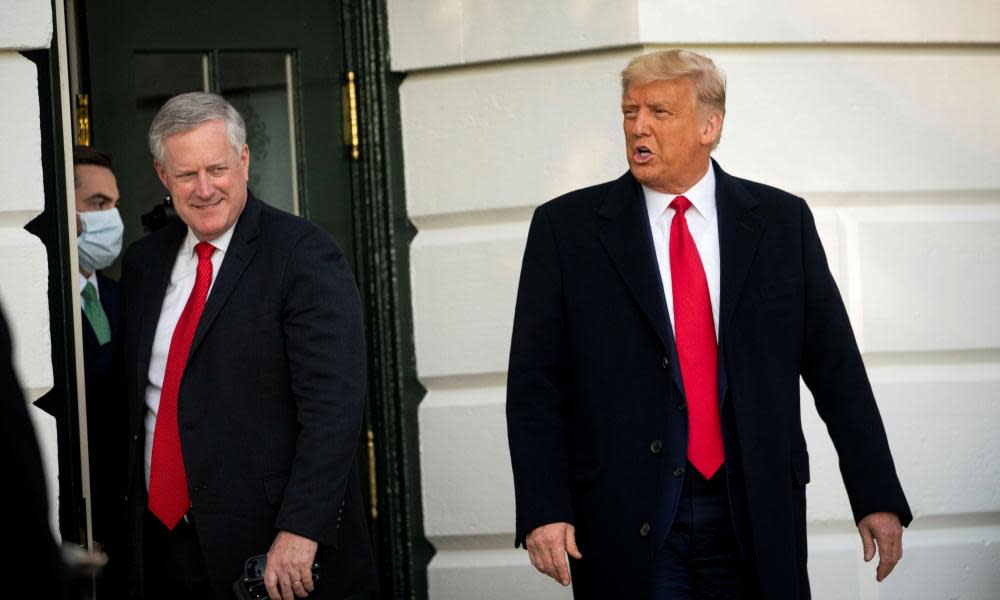Trump and Meadows joked about Covid on plane after Biden debate, book says

- Oops!Something went wrong.Please try again later.
- Oops!Something went wrong.Please try again later.
- Oops!Something went wrong.Please try again later.
Donald Trump and his chief of staff Mark Meadows joked about the then US president having Covid on Air Force One after the first debate with Joe Biden in 2020 – an event at which Trump was not tested but three days before which, Meadows later confessed, Trump had indeed tested positive.
On the flight, on 29 September 2020, Trump speculated about his health, saying he thought his voice had sounded “a little bit off” at a rally in Duluth, Minnesota. But he also said he did not want the media to “accuse me of something ridiculous, like having Covid”.
Related: Rupert Murdoch often wishes Donald Trump dead, Michael Wolff book says
Meadows “laughed and promised him that we would handle it if it happened”.
“We” referred to Meadows and Cassidy Hutchinson, the chief of staff’s closest aide who has now written a memoir, Enough. The book, which describes Hutchinson’s journey from Trump loyalist to key witness in the January 6 inquiry, will be published in the US next Tuesday. The Guardian obtained a copy.
In December 2021, the Guardian obtained a copy of Meadows’s own memoir, The Chief’s Chief. In that book, Meadows revealed that Trump tested positive for Covid three days before debating Biden but disregarded the test after another came back negative and then, despite showing worsening symptoms, carried out public events including the debate and a reception for bereaved military families.
Trump denied the account, calling it “fake news”. Remarkably, Meadows agreed, saying of his own book: “Well, the president’s right, it’s fake news.”
Hutchinson, however, writes that Meadows all but admitted the positive test right after the flight. When she and Meadows were in a limo after the plane ride back to Washington from Minnesota, she writes, she asked if Trump had Covid.
He did not answer, but “his silence answered every question I had”, Hutchinson writes. “The virus had reached the highest echelons of power.”
Trump sickened rapidly but resisted his eventual hospitalization. Once ensconced at Walter Reed National Military medical center, he insisted on taking a limo ride to greet supporters, potentially endangering Secret Service agents. He then discharged himself before doctors deemed him ready, attempting to stage a triumphant return to the White House that convinced few observers.
In her memoir, Hutchinson also describes other scenes before and after Trump’s Covid bout in which he also showed disregard for his own safety and that of those around him.
On Thanksgiving Eve 2020, Hutchinson writes, a group of Pennsylvania legislators, brought to the White House by Rudy Giuliani as Trump sought to contest his defeat in the election by Biden, were tested for Covid shortly before meeting the president.
Several tested positive.
Hutchinson prepared to take only the guests who tested negative to the Oval Office, only to be ordered by Trump: “I said everyone! Bring them all! Bring them all now!”
Doctors who overheard “immediately urged me to push back”, Hutchinson writes, but she told them she “was not in the business of defying the president’s orders”. Sean Conley, then physician to the president, “reluctantly agreed” and told the Covid-positive guests to wear masks.
“When everyone had filed into the Oval Office,” though, Trump “instructed the masked guests to take off their masks. He assured them it was more important for him to see their beautiful faces, said he was not worried about contracting the virus.”
Trump, Hutchinson writes, said that because he had recently been infected, he did not fear contracting Covid again.
Trump’s own antipathy to masks, and its effect on willingness to mask up among his ardent supporters, was established early in the pandemic. Notably, Hutchinson describes a visit to a mask-making factory in Phoenix, Arizona, in May 2020, in the chaotic and frightening first months of the Covid onslaught.
Trump was widely criticised for not wearing a mask during the tour of the Honeywell facility, though workers did and a sign was visible that read: “Attention: Face Mask Required in this Area. Thank You!” In a coincidence widely if mordantly noted, Live and Let Die, Paul McCartney’s theme song to Roger Moore’s first appearance as James Bond, played as Trump toured the plant.
Trump told reporters he tried a mask but did not wear it after consulting the company chief executive. Hutchinson writes that in fact Trump “decided on a white mask”, then asked staffers what they thought.
“I slowly shook my head,” she writes. “The president pulled the mask off and asked why I thought he should not wear it.
“I pointed at the straps of the N95 I was holding. When he looked at the straps of his mask, he saw they were covered in bronzer.”
Trump’s reliance on heavy makeup is well documented.
“Why did no one else tell me that,” he snapped. “I’m not wearing this thing.”
“The press would criticise him for not wearing a mask,” Hutchinson writes, “not knowing that the depth of his vanity had caused him to reject masks – and then millions of his fans followed suit.”

